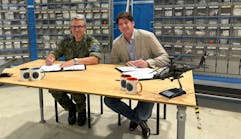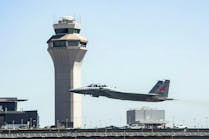DDC-I’s Deos Safety-Critical Real-Time Operating System to Fly Aboard Bell 360 Invictus
DDC-I, a leading supplier of software and professional services for mission- and safety-critical applications, announced that its Deos safety-critical DO-178 real-time operating system has been selected by Bell Textron, Inc. for use in a Data Concentrator Unit (DCU) that will fly aboard the Bell 360 Invictus as part of the U.S. Army’s Future Attack Reconnaissance Aircraft (FARA) Competitive Prototype program. The Bell 360 is an innovative, high-performance aircraft that will deliver soldiers an agile and lethal solution to win on the modern battlefield.
“We are excited for the opportunity to fly aboard this impressive aircraft,” said Greg Rose, vice president of marketing and product management at DDC-I. “FACE 3.0 conformance, best-in-class safety-critical performance and rapid safety certifiability make Deos the preferred platform for advanced avionics subsystems, especially those requiring portable, upgradeable multicore solutions that meet the CAST-32A objectives.”
“The Bell 360 Invictus offers great improvements in capability for soldiers and our team has designed this aircraft to mitigate technical risk and improve survivability at an affordable cost,” said Jayme Gonzalez, program manager, Bell 360 Invictus. “We look forward to working with DDC-I as their proven solutions incorporate the required Modular Open Systems Approach (MOSA). These modular DCUs work well with Bell’s intent to deliver a versatile weapon system that emphasizes operational availability, sustainability, and maintainability for attack and reconnaissance missions.”
DCUs are modular sensor interface units that collect and convert analog flight data, managing, monitoring and controlling discrete analog and avionics bus data inputs from aircraft equipment and sensors, to and from the Vehicle Management System (VMS) and Heath Usage Monitoring System (HUMS). The DCU provides a variety of standard communication interfaces, including MIL-STD-1553, RS-422, ARINC-429 and Ethernet. It also supports hundreds of digital and analog I/O interfaces, including programmable discrete, A/D, D/A, strain Gauge, thermocouple, RTD, variable reluctance/monopole, chip-detect and LVDT with AC reference measurement signals.
Deos is a safety-critical embedded RTOS that employs patented cache partitioning, memory pools, and safe scheduling to deliver higher CPU utilization than any other certifiable safety-critical COTS RTOS on multi-core processors. First certified to DO-178 DAL A in 1998, Deos provides a FACE Safety Base Profile that features hard real-time response, time and space partitioning, and both ARINC-653 and POSIX interfaces.
SafeMC technology extends Deos’ advanced capabilities to multiple cores, enabling developers of safety-critical systems to achieve best in class multi-core performance without compromising safety-critical task response and guaranteed execution time. SafeMC employs a bound multiprocessing (BMP) extension of the symmetric multiprocessing architecture (SMP), safe scheduling, and cache partitioning to minimize cross-core contention and interference patterns that affect the performance, safety criticality and certifiability of multi-core systems. These features enable avionics systems developers to address issues that could impact the safety, performance and integrity of a software airborne system executing on Multi-Core Processors (MCP), as specified by the Certification Authorities Software Team (CAST) in its Position Paper CAST-32A for Multi-core Processors.


